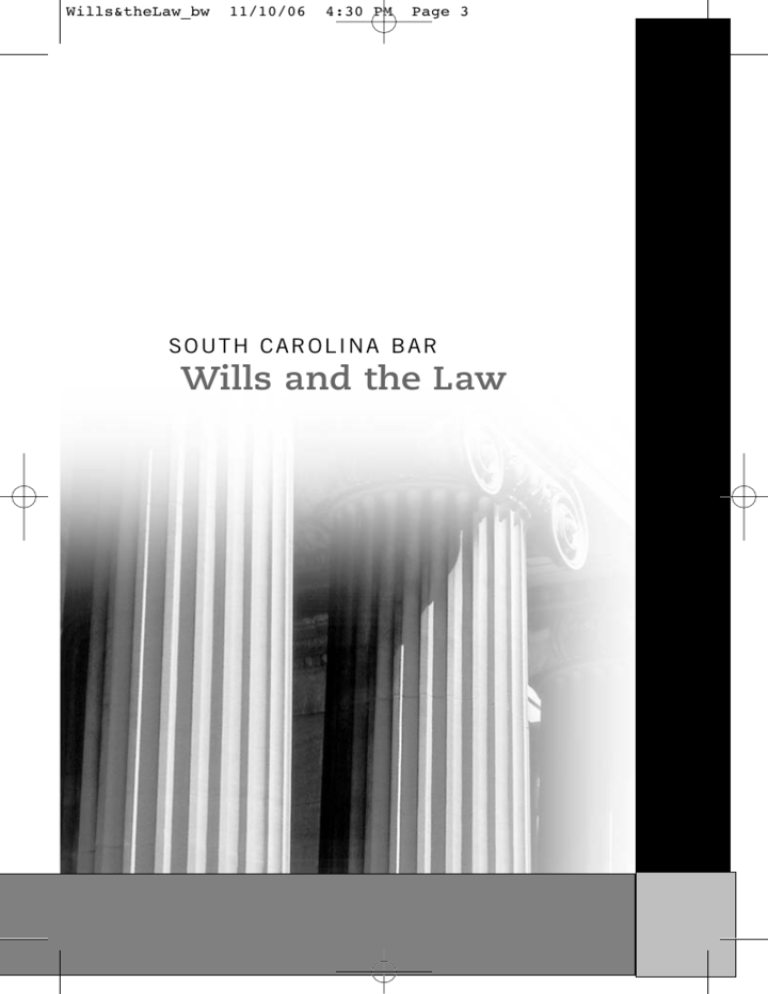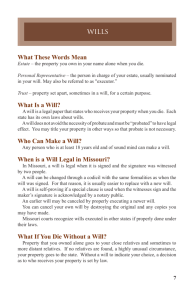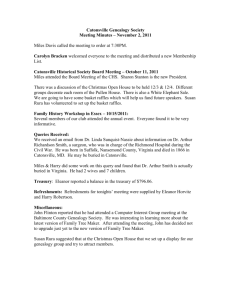SC Bar Wills and the Law
advertisement

Wills&theLaw_bw 11/10/06 4:30 PM Page 3 SOUTH CAROLINA BAR Wills and the Law Wills&theLaw_bw 11/10/06 4:30 PM DO YOU NEED A WILL? Anyone who owns property and wants to control who receives the property after his or her death should have a will, regardless of the value of the property. Of course, the larger the estate, the greater the necessity for expert estate planning and for a valid, up-to-date will. REASONS TO HAVE A WILL • With a will, you decide how your property will be distributed. You may make any disposition of your property that is not inconsistent with the laws or contrary to the policy of the state of South Carolina. Protective provisions of the South Carolina Probate Code grant a spouse who is left out of a will an election to take a onethird share of the “probate estate” under certain circumstances. A similar provision grants a share to a child who is left out of a parent’s will written before the child’s birth in some circumstances. If you die without a valid will, your assets will be distributed according to a rigid statutory formula that makes no allow- Page 4 ances for your personal wishes. The state statute may direct that your property be distributed differently than you would have distributed it under a will. • A well-prepared will may reduce your estate taxes. However, after death, less can be done to alter the tax status of an estate. The tax consequences depend, of course, on the individual characteristics of each case and should be discussed with your lawyer. Not all estates are subject to death, estate or inheritance taxes. • With a will, you can choose the individual(s) and bank or trust company you want to serve as the personal representative (executor) of your estate and to manage and settle your estate according to the law and the terms of your will. If there is no will, a court-appointed administrator serves as personal representative. • With a will, you can save unnecessary expenses involved in the administration of an estate. Bonds may be required of court appointed a t b t t e b p t •P w p g p a a n •I t c m t •Y c WHA WILL If y Caro deter prop an ad desig and Oft e may be an ed it y . ss can status nserse, terisould re or ose nk or to preour nd ing to f your trator senta- e ration be ted Wills&theLaw_bw 11/10/06 4:30 PM administrators, and many times this expense is avoided by simply stating in your will that your personal representative need not give bond. Real estate and other assets can be sold without court proceedings if your will authorizes such sales. • Parents can suggest in their wills the names of those people who they want to be guardians for the person and property of a minor child or an incapacitated adult, although such suggestions are not binding on the court. • In a will, you can establish trusts to lower taxes and to control both the financial management and the ultimate takers of your property. • You can also make gifts to charity in your will. WHAT IF YOU DIE WITHOUT A WILL? If you fail to make a will, South Carolina’s inheritance statute will determine who gets your property. The court will appoint an administrator, from persons designated by law, to manage and settle your estate. Often the cost of administering Page 5 an estate without a will is greater than if the person had planned the estate with a will. Your property will not go to the state, however, unless you have no known close relatives. HOW LONG IS A WILL VALID? A will is valid until changed or revoked as allowed by the law. No will becomes final until the death of the testator, and it may be changed or added to by the testator by drawing a new will or by drawing a “codicil,” which is simply an addition or amendment executed with the same formalities as a will. A will’s terms cannot be changed by writing something in after the will is signed. Certain changes in the circumstances of the testator after the signing of a will, such as the testator’s marriage or divorce, will revoke all or some portions of the will unless the will states it is made in the contemplation of such an event. Changes in the circumstances of a testator require careful analysis and reconsideration of all provisions of the will and often make a change in the will advisable. DOES JOINT No. some device Wills&theLaw_bw ater ed te, or w. he may e l or is ment e will umhe will the s f e es of ange 11/10/06 4:30 PM Page 6 DOES PLACING ALL PROPERTY IN JOINT OWNERSHIP SUBSTITUTE? substitute for a will. Joint ownership may result in No. While joint ownership in adverse tax consequences, some cases is a useful legal and joint ownership does device, joint ownership is not a not provide for the distribution of the property in the event that What are the requirements? joint owners die at the same time. A will is the legal declaration of a person’s disposition of his or her property after death. The laws of each state set forth the formal requirements for a will in that state. In South Carolina: 1. You, the maker of the will (called the testator), must be at least 18 years old or be married. 2. You must be of sound mind to know your estate, the objects of your natural affection and to whom you wish to leave your estate. 3. The will must be in writing. 4. Your will must be witnessed by two witnesses in the special manner provided by law. 5. It’s necessary to follow exactly the technical formalities required for executing a will. DOES A WILL INCREASE PROBATE EXPENSES? No. When a person dies, the distribution of his or her property must be administered by the probate court. This is true whether the person dies with or without a will. Therefore, the existence of a will does not increase probate expenses. In fact, a will frequently reduces expenses. If there is real or personal property that would pass by will or descent, the probate court has the jurisdiction to either rule on the will or determine the legal Wills&theLaw_bw 11/10/06 4:30 PM heirs. Thus, even if you do not have a will, your heirs must go to court to administer your estate or to obtain a determination that administration is unnecessary. SOME SUGGESTIONS... • If you have moved to South Carolina from another state, it would be wise to have your will reviewed by a South Carolina lawyer. However, a will that was properly signed and valid in another state generally will be recognized as valid in South Carolina. • Be sure that you sign your will in the presence of your lawyer, who knows exactly how and in what order the will should be signed. No matter how perfectly a will is prepared, unless it is properly signed and witnessed in strict compliance with the laws of South Carolina, the will may be entirely void. • There were sweeping changes in both state and federal estate and gift tax laws in 1986 and 1987. The Page 1 entire South Carolina Probate Code was rewritten, effective July 1, 1987. If your present will has not been reviewed by your lawyer since the passage of these laws, it should be reviewed to determine what, if any, action should be taken. Your will should be reviewed if you have personal or financial changes, such as the death of a spouse. WHO SHOULD PREPARE A WILL? The drafting of a will involves making decisions that require professional judgment that can be obtained only by years of training, experience and study. A practicing lawyer can help you avoid the innumerable pitfalls and advise you of the course that best suits your individual situation. Wills&theLaw_bw 11/10/06 4:30 PM Page 2 General information: South Carolina Bar Lawyer Referral Service If you need a lawyer, contact the South Carolina Bar Lawyer Referral Service from 9 a.m. to 5 p.m. Monday through Friday. Call 1-800-868-2284; if you are in Richland or Lexington Counties, call 799-7100. Additional Legal Tips Available To access prerecorded information on other legal issues, call the South Carolina Bar’s LawLine. In the Columbia area, call 771-0011. From anywhere else in South Carolina, call 1-800-521-9788. Follow the recorded instructions. Provided as a public service of the P.O. Box 608 | Columbia, SC 29202 (803) 799-6653 | Fax: (803) 799-4118 www.scbar.org Copyright ©2006 South Carolina Bar Printed 2006







